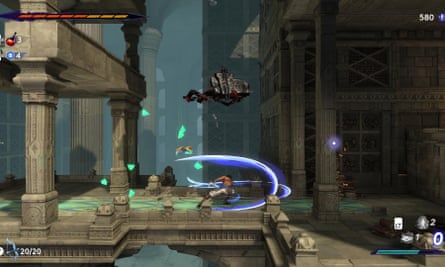Fixed in the sky above the entrance to Mount Qaf is a titanic statue frozen in the moment of its destruction; the pieces of a granite head shattered into chunks hang suspended in mid-fall. In the castle’s tangle of trap-laden corridors, you will find characters who haven’t aged a day in a hundred years, while others who arrived hours before you have already died of old age. Time doesn’t obey normal rules within the cursed halls of the fortress, and you would do well to learn that lesson fast if you want to complete Prince of Persia: The Lost Crown.
These oddities of time are appropriate for a game that reimagines and combines multiple generations of a series that dates back to 1989. Developer Jordan Mechner’s original Prince of Persia was a 2D platformer in which you navigated a castle filled with false floors, guillotines, and sword-wielding guards to battle with the Grand Vizier. Meanwhile, in developer Ubisoft’s hands, later reimaginings of the series saw the titular hero gain the ability to control time, pausing and reversing it to solve puzzles and dodge traps in a 3D world. In The Lost Crown, Ubisoft returns to the earlier games’ side-on perspective while folding in the power over time of the later titles to create a sprawling, labyrinthine world littered with enemies and traps to overcome.
You play Sargon, one of Persia’s legendary warrior defenders, in his pursuit of Prince Ghassan and those who took him. You chase the group to Mount Qaf, where the kidnappers hope to force the prince to abdicate, and you must reach him before they do. Sargon can jump over pits, swing from pole to pole, and leap between the walls of tight shafts to ascend the levels of Qaf, but even this athleticism only allows you to access a small portion of the fortress: you will often face gaps too large to jump, ledges too high to grasp or doors with locks too distant to strike with your swords. However, as you discover the mountain’s secrets and defeat its many bosses, you learn how to dash through the air, double jump, and anchor yourself to a point in space to which you can teleport back. By combining these powers, you can pull off complicated mid-air acrobatics and open up whole new districts of Qaf to explore.
The Lost Crown is Prince of Persia reforged as Metroidvania, and the series feels at home in that genre of ever-widening worlds. You will return and return and return to the same areas of the map, discovering new secrets in old rooms thanks to the powers you have acquired. Chests that were out of reach before fall within your grasp, locked doors now swing open before you, and bosses that were too fast or too strong are now vulnerable to your strikes.
That all said, The Lost Crown’s difficulty curve is severe, with later platforming sections and bosses demanding you memorise punishing attack patterns and develop reflexes to pull off complicated combinations of jumps, dodges, and parries. Butting into one of these skill walls is a frustrating experience, particularly in a game where the joy comes from stringing together uninterrupted acrobatics and attack combos.
In moments where you encounter a frustrating blocker, however, you can often explore other parts of Qaf. When you find a new power, it usually opens opportunities all over the mountain, not just in one area. You can also upgrade Sargon’s weapons to be more powerful, buy upgrades to his health potions, or change his configuration of amulets. These unlockable items let you augment your hero’s abilities, increasing his strength when he has low health, for instance, or reducing how much damage he takes from poison attacks. If you find a boss you can’t defeat, it’s reassuring to know you can make the fight easier by swapping out some of the amulets you take into battle.
Prince of Persia: The Lost Crown isn’t a sequel or a prequel to any of the other games, it is a new journey for the series, and its first step is a confident leap. It’s not only that the most notable elements of the series’ different iterations – its setting, traps, time powers, and combat – all find a natural home in this new shape, it’s that it plays like one of the best games in its newly chosen genre, as good as a game as Metroid Dread or Hollow Knight, not an imitation of them. It’s been 13 years since the last wholly new Prince of Persia game; if this is its new direction, it is exciting to see where it will land.
after newsletter promotion

